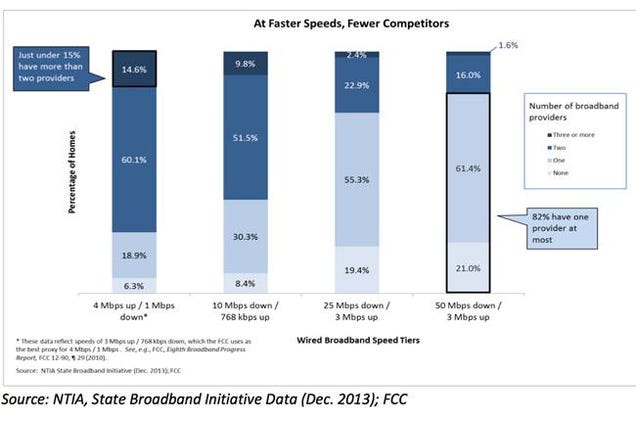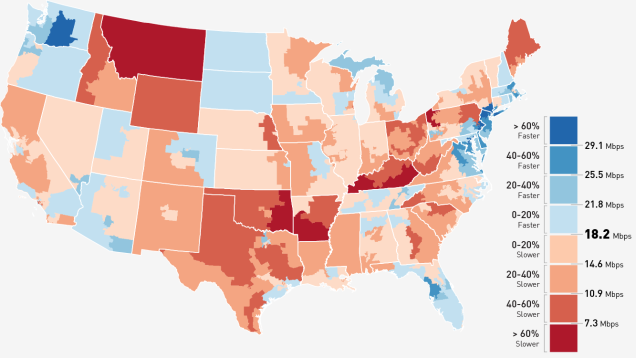The FCC Just Redefined Broadband So Expect Faster Internet
52,529
20
The Federal Communications Commission (FCC) just voted to redefine broadband as "internet which is actually fast enough to use." Now, in order to call its service broadband, companies will need to guarantee download speeds of 25 megabits per second or faster and upload speeds of 3 Mbps or faster. This is really, really good news.
This decision might seem arbitrary at first. After all, the FCC is just changing the definition of broadband—it's not actually forcing internet service providers to speed up connections. That's inevitably what this new policy should accomplish, however. Think about it this way: If a company can't call its service broadband, everybody will know that it's slow. So if they want to stay competitive, they'll have to guarantee faster speeds.
The new policy will benefit those in rural areas and tribal most. About half of Americans in rural areas don't have access to 25 Mbps down/3 Mbps up speeds, meaning that they can't take advantage of a lot of the internet's best goodies (read: streaming video). Just look at the spread:
Previously, the FCC defined broadband as 4 Mbps for downloads and 1 Mbps for uploads. That's well below the current national average of 32.4 Mbps up and 9.9 Mbps down, and it's certainly too slow to support America's streaming video habits. So it makes good sense that the FCC wanted up change the definition of broadband—a word that's synonymous with high-speed internet—in order to motivate ISPs to improve service in those underserved areas.
That's the official take on the change. Unofficially, however, the FCC's actions stand to shake up the cable industry in some other interesting ways. The redefinition of broadband should increase competition between ISPs and cable companies as well as encourage the development of better infrastructure. The new policy could also affect the outcome of the pending Comcast-Time Warner Cable merger, since the new definition means that Comcast now has fewer competitors in its broadband business. That means the Department of Justice might decide that a Mega-Comcast would look even more like a monopoly.
Of course, none of this is going to happen overnight. The FCC will have to keep a close eye on the industry to ensure that ISPs are advertising their services like they're supposed to, and many of the ISPs will need a little bit of time to upgrade their offerings. This is the first step towards progress, though. The FCC's next step? Net neutrality rules.
Image via Getty
The following replies are approved. To see additional replies that are pending approval, click Show Pending. Warning: These may contain graphic material.
If you're going to define a speed for what is considered usable internet, it should be defined in milliseconds of latency. Not in megabits per second.
No, it shouldn't, but nice try. Latency doesn't make your movie buffer, but it might slow down, in a miniscule amount, your pecking around 4chan if it is really horrendous. While latency is certainly a component of an SLA, it's not the key.
In all fairness, it should include both, as well as uptime.
Video streaming might be the biggest consumer of throughput on the internet, but it's FAR from the most important use of internet access. If you have a 20Mbit connection to a geosynchronous sattelite, you have a shitty high latency connection that isn't good enough for much else than video streaming. If you have a 3mbps low latency connection, you have e-mail, messaging, web, VoIP, smart-device connectivity, remote access to a VPN'd desktop... And you can still stream video if you wait for a bit of buffering.
Let's build the internet. Not packet-based cable TV.
Well, until we can get a handle on the script kiddies and the whackers and their botnets, latency is going to be a sporadic problem. But you're right, that is addressable through technology, but those who want to attack and disrupt will always have the edge over the aggressor.
I find the speculation that this is going to change the way ISPs behave rather naive. The FCC's definition of broadband isn't relevant to anyone except the FCC, and the FCC doesn't regulate advertising, so I can't see how this is going to change how the ISPs advertise their services. Hell, I'm guessing you can find advertising for "broadband" that is sub-4 mbps right now. The FCC's desire to stimulate competition also isn't limited by its broadband definition, so contrary to the linked article's premise, this isn't going to suddenly increase the competitive scrutiny of anything. The only thing this really does is mean that USF broadband money is now really just going to go for 25+ mbps builds, but I'm guessing most greenfield builds eligible for USF funding were going that way anyway. It also means that the pretty broadband maps the FCC waives around won't be quite as pretty anymore, but the prospect that changing the maps is suddenly going to change the political landscape is pretty remote.
Well, if you take a look at a chart that shows how many choices a customer has for a "broadband" connection, it matters a whole lot! Over 74% of the nation only has access to ONE broadband provider under the new definition...and this influences exactly how the FCC will regulate ISPs...including deciding on whether to approve the mega merger between Comcast and Time Warner Cable.

I don't think so. You don't change whether a service is competitive or not by how you (or the FCC) labels the service—at least serious economists don't. DOJ's antitrust division, which I would argue is more critical to the determination of whether the merger is anti-competitive or not, is most definitely populated by serious economists. In a very real sense, no one cares whether you call it broadband or anything else, competition is about "product markets" and product markets get defined by whether consumers can substitute one product for another.
Besides, mergers are concerned with whether there is a reduction in competition, not whether one of the parties happens to be a monopoly one place or another. In other words, traditional analysis would say that most of the TWT/Comcast footprint is absolutely irrelevant because they don't compete with one another. So, changing the definition doesn't alter the merger analysis a bit.
I disagree. You hear (mainly Republican) lawmakers arguments...and for YEARS they have been saying that there is "plenty of competition" in broadband. Well, now, under the new definition, they can't keep saying that. It DOES change the argument. And it lays bare just how anti-competitive the US broadband market has become.
Do you honestly think that a single lawmaker is going to alter their rhetoric based on whether the FCC changes the definition of broadband? The guys on the Hill know, with an absolute certainty, that if they say "broadband" nearly everyone will understand that only to mean "Internet access that is better than dial up AOL." Trust me on that one. Ask anyone in Congress and what you will get is a variation on "Congress gets to tell the FCC what to do, the FCC doesn't get to define how Congressmen talk to the world." So, I think you continue to be naive.
I'll also take issue with your last statement that this exposes "how anti-competitive the US broadband market has become." Your use of "become" implies that conditions have gotten worse, which is folly. Not too long ago, local jurisdictions granted monopolies to cable companies and used their franchising authority to prevent new entry. The situation today is much more competitive. The Congress and the FCC have pried open local markets to create options, plus wireless speeds are at the point where they are a competitive alternative for some. The fact that mergers have resulted in larger companies doesn't mean competition has decreased—if there was one provider in one area and one provider in a different area and they merge, they haven't changed the competitive situation one iota. So I'm not getting how the situation has "become" worse. The situation may not be as competitive as you might like, but changing the definition of broadband has fuck all to do with the choices available to you or I as a customer.
Arggh! there goes a...snake a snake!Adam Clark Estes
Noob question here, but why are download speeds typically faster than upload speeds? Is it just that they allot more for downloading because the proportion of downloading is higher than uploading or is it technologically a different process and uploading is inherently slower?
To my understanding, it is because we typically upload significantly less than we download. I don't know the long answer as to technically "why".
Most end-users download much more than they upload, so there's no real benefit to offering higher upload speeds. (The ones that need upload capacity, usually are willing to pay extra for it.)
Also, the most common technologies are inherently asymmetric (DSL, cable modem, and most forms of wireless are like this). There probably isn't as much work to resolve this, because most end-users don't need it anyway, and there are options (dedicated wireless, T1/T3/whatever, fiber) for those that really do.
The original idea behind upload being slower was based on DSL lines having that limitation. It serves a dual purpose to the ISPs that have a closed mind as well to lessen the likely hood of you wanting to host a website off of your home connection. Most ISPs in the latter category just block inbound connections on that port.
It all comes down to money really.
You typically download a lot more than you upload. If the pipe is a certain size, you'd be wasting bandwidth if you had too much of it sitting there waiting for upload traffic so it's usually split to be more download heavy.
Remember when it was defined as 200kbps? Man, that connection screamed....!
I'm thrilled and a little disturbed by the fact that I can now say, without a hint of irony, like the old man down the street: "Why, in my day, we had 1200 baud dial-up... AND WE LIKED IT!!!"
Lol, glad you missed the 75 baud acoustic coupler days!
You had 1200?!? I only had 300.
My first modem was 300 baud, and the bits had to travel uphill, both ways, through two feet of snow.
I'm guessing tomorrow I'll get a notice from Time Warner Cable that my "Broadband" service is now "High Speed" service. Does anyone really think this is gonna make the service providers give us a better product? Maybe for double the price.
Exactly. ISPs will simply say "high speed" instead of "broadband." Many of them do already.
Time Warner already does this with their lowest-level offering in many markets, as it was below the old minimums.
Comcast doesn't say 'broadband' anywhere on the page, except at the very bottom in tiny text.
Time Warner in my area a few months back just automatically upgraded everyone to higher speed without changing the price. My 20M service became 100M overnight.
If I'm understanding this correctly, they can still offer slower speeds and just not call it "Broadband".
They already don't care, I doubt this is going to make much of an impact.
They already don't care, I doubt this is going to make much of an impact.
In the articks he states that if you can't call you service broadband people won't want to sign up and you'll lise customers and lose revenue. There's nothing here that's forcing anyone to upgrade their service to customers but it will from a marketing standpoint. And as we know, marketing and public perception is the key to all consumer end businesses.
Some of the big ISPs already do this with their lower-speed service levels. The impact come into play with taxes and regulation. Some tax breaks offered to ISPs for bringing service to new areas are contingent on that service being considered broadband, so they will have to bring the good stuff to get the tax breaks. As far as regulation is concerned, the change means that Comcast and Time Warner Cable just became actual monopolies in many, many places because their so-called broadband competitors in many regions that just barely counted as broadband providers can no longer be claimed as competition in the FCC review of the proposed merger between Comcast and Time Warner Cable, which gives the FCC a lot of legal cover to reject the merger.
I get that's the idea, but it doesn't seem to work out that way.
For starters, most people don't have a choice in carriers, and their level of speed is even often determined for them. A lot of areas won't even have the choice of "broadband" now, especially rural and low population areas.
For starters, most people don't have a choice in carriers, and their level of speed is even often determined for them. A lot of areas won't even have the choice of "broadband" now, especially rural and low population areas.
Which is good, because that ideally will show how Time Warner & Comcast have a monopoly over their markets.
"Think about it this way: If a company can't call its service broadband, everybody will know that it's slow. So if they want to stay competitive, they'll have to guarantee faster speeds."
Yup. If my ISP just decided to say, "Fuck it, we just won't offer broadband", then I'll just switch to...wait...shit. Never mind.
The bigger deal is that certain tax breaks offered to ISPs when expanding into new areas are contingent on them offering broadband internet, so if they don't meet the requirements for the service provided being called broadband, they lose out on the tax breaks.
What tax breaks? Are you talking about USF funding? I cannot believe anyone doing a greenfield build anywhere isn't already planning for 25+ mbps service.
I'm not yet convinced this is going to have much of a positive impact. Many communities will go from having two "broadband" providers (DSL and cable) to having just one.
Now, maybe that's meaningless because DSL was just as slow prior to this change as it was before, and people care about the number attached to the speed more than they care about what it's called. That's my hunch. But then that implies the "broadband" label carries little meaning to consumers, so this change won't really impact things.
On the other hand, if "broadband" really does matter to customers, then the cable companies just got an even stronger advantage over DSL (and Uverse), so how will this spur them to raise speeds or reduce prices?
It's not as if AT&T, now ineligible to market broadband, can quickly raise the speed of their DSL a service. If that were possible, they would have done so already, considering they've lost their competitive position against cable long ago.
So the way I see, it's either meaningless and will have no impact, or it is actually meaningful and will have no or possibly negative impact. Time will tell.
What it means is that ISPs will have to put in the effort to bring better service to rural areas in order to qualify for certain tax breaks, in addition to the big bully ISPs not being able to make the argument to lawmakers and regulators that they are not monopolies because they face "competition" from regional providers that barely met the old minimum requirements. Hopefully, this change is a prelude to the FCC striking down the Comcast/Time Warner Cable merger AND instituting strong Net Neutrality regulations that promote consumer interests, innovation, and competition.
Another noob question, but how is the download speed measured? What I mean is, connected to what? We already know some ISPs will throttle things like Netflix (even if they claim they don't) and a connection to one site doesn't mean it's going to be as fast as a connection to another site given the nature of how the internet works. And that's not taking into account congestion/traffic on any given day at any given time to any given site.
So when they say a download speed of X, what is that downloading from/connected to? Do they mean my "last mile" connection between me and the ISP?
So when they say a download speed of X, what is that downloading from/connected to? Do they mean my "last mile" connection between me and the ISP?
I'm not entirely sure - I do know that my 50 Mbps connection tests at 54Mbps when I use Speedtest.net, and I can often download from Steam and Origin at speeds of 5+ MB/sec.
Yeah, but that's just a connection to whatever server you decide to tell SpeedTest to connect to (or if you just leave it at the default one it picks for you, which is typically the closest one). That doesn't mean you'll get those download speeds as soon as you try another random server somewhere.
Just is curious how it's measured, is all.
Just is curious how it's measured, is all.
Woo! Way to go FCC! Now make it a utility!










































No comments:
Post a Comment
Please leave a comment-- or suggestions, particularly of topics and places you'd like to see covered